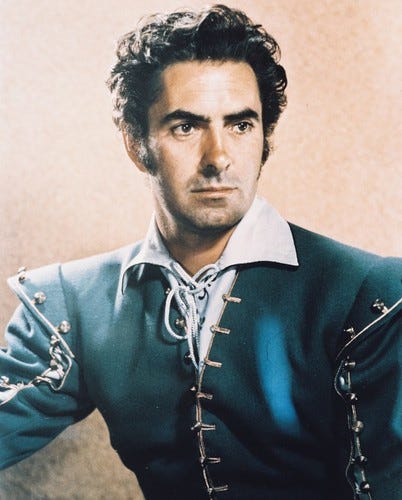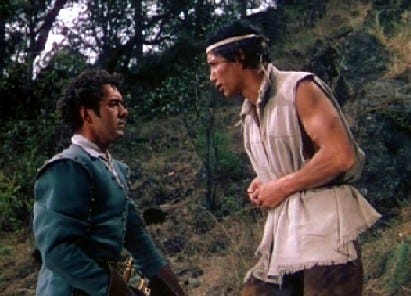Tyrone Power was my godfather. Not really my godfather, a sort of a spiritual godfather. He threw the fairy dust that made my father, however briefly, into a leading man, a bon vivant, a catch. He blessed my parents’ marriage, he made me possible.
At the beginning of 1947, my father and mother had not yet met. There was a one-in-a--gazillion chance of my ever coming into existence. The odds were against me. My mother was in Toronto, freshly demobilized after the war, and finishing her undergrad degree in psychology. My father was a farmer near Waterford (in Norfolk County). Winter was his off season, and somehow he colluded with the town doctor, a man named Winston Sutherland, to gallivant off to Mexico for a month at the end of January.
I know little about this trip except for the important bit. They seem to have gone to Mexico City. I have a blurred photo of the Temple of the Moon. But they ended up in Acapulco where they caught sailfish.

Now, you have to imagine this story as three distinct plots, three independently moving parts. There was my mother in Toronto. There was my father in Acapulco with Doc Sutherland. And third, there was the great American movie actor Tyrone Power also in Mexico, filming a romantic adventure movie Captain from Castile (let’s just say it’s about Spanish conquistadors, Indians, the Conquest of Mexico, and would not be made today). Power was filming at various locations, vectoring toward Acapulco where the production was to wrap up in February (Acapulco was going to stand in as Vera Cruz, and the Pacific was going to stand in as the Atlantic). My mother didn’t know about my father and my father didn’t know about her and Tyrone Power didn’t know either of them. But they were all moving in sync, in some mysterious and rather elegant dance.
Then one night my father was having dinner in an Acapulco nightspot with Doc Sutherland. He was tanned and fit and possibly wearing the sombrero he’s wearing in the photo above. I doubt he brought the sailfish with him. There was a mix up. Fate stepped in. The waiter gave Tyrone Power’s dinner to my father (yes, they had managed to get to the same restaurant) and Tyrone got my father’s. My mother told me this story a couple of months after my father died. It was perhaps her way of explaining things, me, the marriage, etc.
Here’s my diary entry from that night. “July 15 1984 Jean was watching Saturday Night at the Movies and there was Tyrone Power and Jean Peters in Captain from Castille. Well it turns out that they were filming this in Acapulco in 1947 when Murray was there. One night the waiters gave Murray Tyrone's dinner by mistake and they met. After that they would chat and have drinks together at the bar.”
Something magical happened. There was Tyrone, the famous movie star in a doublet, and my father, in his sombrero, about the same age, sitting at the bar on the beach at Acapulco, and it gave my father a lift (also he had caught a sailfish, another life-changing experience). He came home to the farm with elan and brio.
Shortly after, March maybe, Murray and Jean met at the Officers' Mess at the Armoury in Simcoe (HQ of the Norfolk regiment; in those days, most everyone had served), and he charmed her (possibly channeling Tyrone). "He was so tanned and handsome," she said.
Two years later, she told the same story to my then girlfriend, still emphasizing that trip to Mexico. “Aug 31 1986 P tells me about a talk she and Jean had about how she and Murray met: How he was just back from Mexico and on a high from that trip, feeling very full of himself, witty, etc.”
So then this happened:
Okay, as it turns out, long before I learned this story, I had a thing aboout Tyrone Power, mainly because of a movie called The Black Rose, which I saw one breathtaking afternoon on our black and white TV.
I liked the movie, of course, because of Tyrone Power’s swashbuckling ways, but mostly because growing up I was pathetically sentimental, and the scene at the end when two taciturn Mongol warriors turn up improbably at the castle in England and deliver Tyrone’s long lost sweetheart (he lost track of her in China, force of circumstance). The camera shifts to the girl (the French actress Cécile Aubry), so excited to see Tyrone (after the problem in China) that she is bouncing on her toes with anticipation.
For an Ontario boy of, say, 13, living on the farm, the vision of Cécile Aubry in Oriental costume bouncing on her toes for love defined the quintessence of romance, what I have been looking for ever since.
This led me to read the book, The Black Rose, a novel by Thomas B. Costain, a writer who happened to have been born in Brantford, just fifteen miles north of the farm. Costain was a best seller of popular historical romances, a cross between Walter Scott and G. A. Henty, and really hard to read today. I read several Costain novels, hoping to recapture the Cécile Aubry moment. This never happened. But reading those historical romances may have had a side effect when it came to my own historical novels, Elle and The Life and Times of Captain N. Both are about as anti-romantic as you can get. Anti-Costain. Anti-Tyrone Power. Who can understand the reversals of the heart and mind? What I loved as a boy morphed into its opposite when I turned to writing.
But still, once again, thank you, Tyrone.
The last little nugget I can draw from this obscure story is that Jay Silverheels, the Canadian actor famous for playing Tonto in the Lone Ranger TV series, also appeared in Captain from Castile. This surprised me, as most things do. He is not credited (he didn’t receive credit for most of his movie work). He played a character called Coatl. I think he’s meant to be an Aztec. Luckily, Jay Silverheels (not his real name) had a sense of humor about being an Indian actor having to play pretend Indians all the time (and not getting credit).1
If you remember a couple of substacks ago I included a Norfolk County map that showed the Six Nations Iroquois Reserve in the northeast corner, maybe four miles from our farm. Jay Silverheels was born and raised on the Reserve, a neighbor almost. So really Mexico at that time, February, 1947, was just packed with Canadians from Norfolk County, and they all knew Tyrone Power.

I really don’t know what to make of this.
My own brush with Hollywood was minimal. In 1979, I was an extra in the Michael Douglas movie Running. It is a truly awful movie about a hapless marathon runner who falls down at the Olympics and limps to the finish last but is somehow triumphant. I am in the scene meant to represent the start of the Olympic trials. I tried to stand as close as I could to Douglas, and kind friends have said they were able to spot me, though I never have. Somewhere in that sea of faces is me, but I can’t find him.
M, my partner, says she saw this movie when she was very young and that’s probably why she fell for me, some unconscious deep memory of me on the movie screen came back to her when she met the real me, and she saw…Tyrone Power.
This is a good metaphor for life, I think. Nothing but chance, coincidence, and really bad movies, which, only afterward, begins to look like Fate.
I briefly had a YouTube link to a 4-minute clip of Jay and Tyrone from the movie, but the clip has disappeared from the Internet. Pity. You can watch the entire movie on Vudu.










Absolutely could not get away with it, if it weren't real. I really like your phrase "improbable and tightly woven."
I strongly disagree, Douglas. I think The Life & Times of Captain N., and Elle are highly romantic. Not as in 💗 “romance” but in the profound “soulfulness”, tragic or joyous, frailties & strengths, that connects us humans. I grew up with an old textbook of my father’s, (circa 1926) called “The Romance of Canada”. It was compelling and graphically illustrated, revealing a history of Canada that would have made any 12-year-old’s heart beat. It did mine. Especially seeing Dollard slain by a nearly-naked Iroquois.
I have written a novel callled “No Worst There Is None”, which was nominated for an “Arthur Ellis Best First Crime Novel Award” but which is a probing, spiritual look at a family’s grief after the sexual murder of a daughter. An ineffable crime occurs, but the novel is about the aftermath of survival.
The Tyrone Power tale was superb…an intimate story of the fluid, meaningful and mesmerizing synchronicity of existence. You romantic…you.